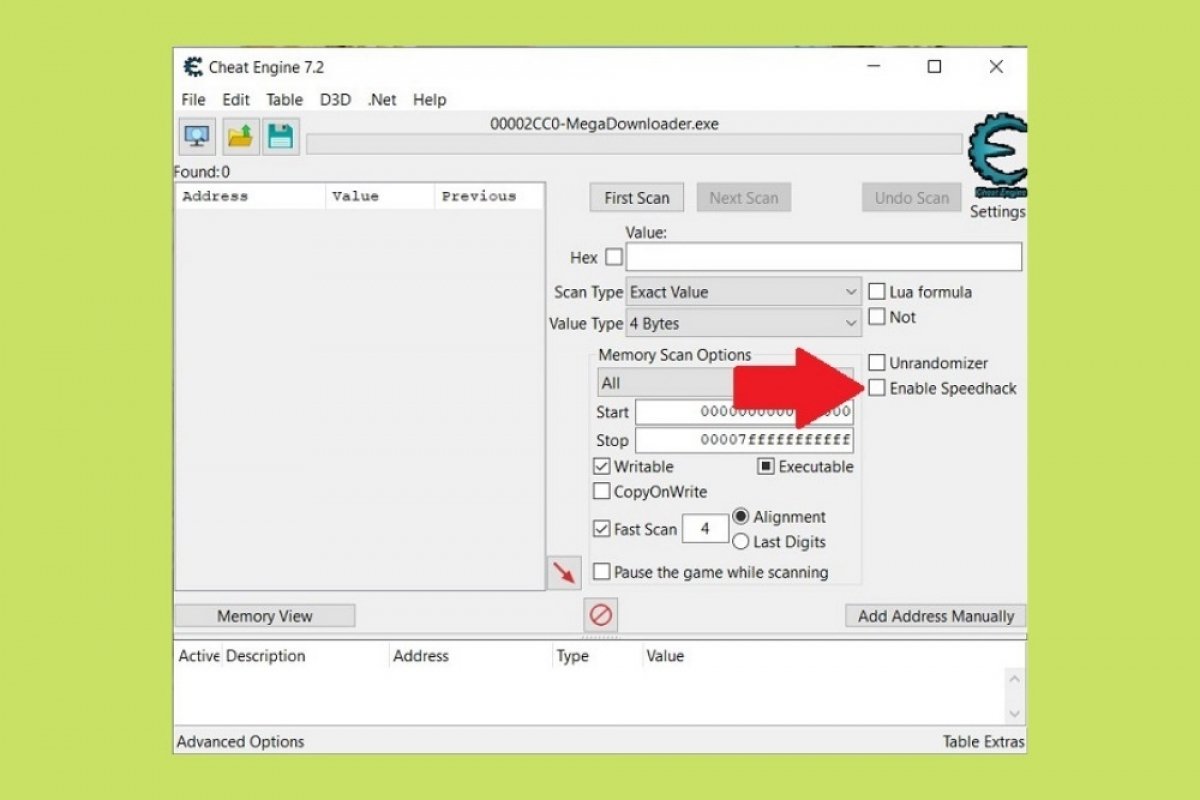Introduction
Welcome to the world of downloading! Whether you are a movie enthusiast, a gamer, or someone who loves to explore the vast expanse of the internet, one thing is certain – faster download speeds can make your life so much easier. We have all experienced the frustration of slow download speeds, which seem to take forever to complete. But worry not, as we have some useful tips and tricks to help you make your mega downloads faster.
Downloading large files can be time-consuming, especially if you have a slow internet connection or are using a crowded server. However, with the right strategies and tools, you can optimize your download speeds and save valuable time. In this article, we will explore various methods that can help you boost your download speeds and make the most out of your internet connection.
From finding the best download server to utilizing download managers and optimizing your internet plan, we will cover a range of techniques that anyone can implement. Whether you are a tech-savvy individual or a beginner in the world of downloads, these tips will help you maximize your downloading efficiency and ensure a smooth experience.
So, without further ado, let’s dive into the world of mega downloads and discover how you can make them faster. By implementing the strategies outlined in this article, you can accelerate your download speeds, save time, and enjoy a more seamless downloading experience.
Find the Best Download Server
When it comes to downloading large files, the server you connect to can have a significant impact on your download speed. Choosing the right download server can greatly enhance your downloading experience. Here are some tips to help you find the best download server:
- Choose a server geographically close to you: Distance plays a crucial role in determining download speeds. Connecting to a server that is closer to your physical location can minimize network latency, resulting in faster downloads. If you have the option to select a server location, choose one that is geographically near you.
- Consider the server’s capacity: Some servers might be overloaded due to high demand or limited bandwidth. Look for a server that has a high capacity to handle multiple connections simultaneously. This can help ensure that you get maximum download speeds even during peak times.
- Research user reviews and feedback: Before selecting a download server, it is a good idea to read user reviews and feedback. Look for servers that have consistently positive reviews in terms of download speeds and reliability. This can give you valuable insights into the performance of different servers.
- Try different servers: Don’t be afraid to experiment with different servers to find the one that works best for you. Many download platforms offer the option to switch servers, so take advantage of this feature and test out different servers to see which one gives you the fastest download speeds.
- Use a server speed test: There are various online tools available that can help you test the speed and performance of different download servers. These tools provide valuable information about latency, download speeds, and server response times. Use these speed tests to identify the servers that offer the fastest download speeds.
By following these tips and considering factors such as proximity, capacity, and user reviews, you can find the best download server that can significantly improve your download speeds. Remember, the right server can make a world of difference when it comes to downloading large files efficiently.
Use a Download Manager
If you frequently download large files, using a download manager can greatly enhance your downloading experience. A download manager is a software application that can effectively manage and accelerate your downloads. Here’s why you should consider using a download manager:
- Pause and resume downloads: One of the key advantages of a download manager is the ability to pause and resume downloads. This feature is incredibly useful, especially when you have a slow or unreliable internet connection. You can pause downloads temporarily and resume them when your connection improves or when it is more convenient for you.
- Simultaneous downloading: Download managers allow you to download multiple files simultaneously. This means that you can divide a large file into smaller segments and download them concurrently, significantly reducing the overall download time. This feature is particularly beneficial if you have a high-speed internet connection.
- Accelerated download speeds: Download managers often employ techniques such as file segmentation and parallel downloading to accelerate download speeds. By dividing files into smaller parts and downloading them simultaneously, download managers can optimize your connection and maximize your download speeds. This can be especially helpful when downloading large files or when dealing with slow internet connections.
- Automatic file organization: Download managers typically have features that automatically organize your downloaded files into specific folders or categories. This can save you time and help you keep your downloads organized, making it easier to find and access your files later.
- Download scheduling: With a download manager, you can schedule downloads to start or pause at specific times. This feature is great for managing your bandwidth usage or for initiating downloads during non-peak hours when your internet connection is faster.
There are numerous download managers available, both free and paid, each with its own set of features. Some popular download managers include Internet Download Manager (IDM), Free Download Manager, and JDownloader. Research and choose a download manager that suits your specific needs and preferences.
By using a download manager, you can optimize your download speeds, efficiently manage your downloads, and have greater control over your downloading process. Say goodbye to slow and unreliable downloads and embrace the convenience and speed that a download manager brings to the table.
Disable Firewall or Antivirus Temporarily
Firewalls and antivirus software are essential for protecting your computer from threats and keeping your data secure. However, these security measures can sometimes interfere with your download speeds. If you notice that your downloads are unusually slow, it may be worth temporarily disabling your firewall or antivirus software. Here’s why:
Firewalls and antivirus programs actively monitor incoming and outgoing network traffic to identify potential threats. They may analyze every file you download, which can slow down the overall download process. By temporarily disabling these security measures, you can potentially boost your download speeds. Here are a few things to keep in mind:
- Caution: Disabling your firewall or antivirus software temporarily means you are temporarily removing an important layer of protection from your computer. It is crucial to exercise caution and ensure that you are only downloading files from trusted sources. Once your downloads are complete, make sure to re-enable your firewall and antivirus software to keep your computer secure.
- Control panel settings: To disable your firewall, go to your computer’s control panel and navigate to the firewall settings. From there, you can choose to temporarily disable the firewall. Similarly, you may have a specific antivirus program installed on your computer that allows you to disable it temporarily. Refer to the documentation or official website of your antivirus software for instructions on temporarily disabling it.
- Alternative security measures: While it is essential to have a firewall and antivirus software installed, you can supplement these security measures with alternative precautions. Keep your operating system and software up to date, avoid visiting suspicious websites or downloading files from untrustworthy sources, and exercise caution when opening email attachments. These practices can help minimize the risk of malware or other threats while temporarily disabling your firewall or antivirus software for faster downloads.
Remember, disabling your firewall or antivirus software should only be done as a temporary measure and for trusted downloads. As soon as your downloads are complete, be sure to enable your security measures again to protect your computer from potential threats.
By temporarily disabling your firewall or antivirus software, you may experience improved download speeds. However, it is crucial to take necessary precautions and only download files from trusted sources to ensure the safety and security of your computer.
Use a VPN to Bypass Restrictions
If you find yourself facing download restrictions or limitations imposed by your internet service provider (ISP) or region, using a virtual private network (VPN) can be a game-changer. A VPN creates a secure and encrypted connection between your device and the internet, allowing you to bypass restrictions and access content that may be blocked or limited. Here’s how using a VPN can help enhance your download speeds:
- Overcome regional restrictions: Some websites or servers may limit access to certain regions or countries. By using a VPN, you can change your virtual location to a region where the content or download server is not restricted. This allows you to bypass any regional limitations and download files at higher speeds.
- Encrypt and secure your connection: VPNs encrypt your internet traffic and provide an additional layer of security. This means that your ISP or any other third party cannot monitor your download activity. Since your traffic is hidden and your connection is secure, you may experience improved download speeds compared to when downloading without a VPN.
- Reduce network congestion: VPNs can also help alleviate network congestion and improve download speeds. By connecting to a VPN server that is geographically closer to the download server, you can potentially reduce the distance your data has to travel. This can result in faster download speeds, especially during peak hours when network congestion is more likely.
- Choose a reliable VPN provider: It is important to choose a reputable and reliable VPN provider to ensure a secure and high-speed connection. Look for VPNs that have a large server network, fast connection speeds, and a good reputation for privacy and security. Some popular VPNs include NordVPN, ExpressVPN, and CyberGhost. Research and select a VPN provider that best fits your needs.
- Consider the impact on latency: While a VPN can help bypass restrictions and potentially improve download speeds, it is worth noting that using a VPN may introduce additional latency or slower response times. This is because your internet traffic has to pass through the VPN server before reaching its destination. However, the benefits of bypassing restrictions and accessing blocked content may outweigh the slight increase in latency.
By using a VPN, you can bypass restrictions, access blocked content, and potentially enhance your download speeds. However, it is important to choose a reliable VPN provider and consider the impact on latency. With the right VPN and server selection, you can enjoy faster and unrestricted downloads, giving you more flexibility and control over your downloading experience.
Close Unnecessary Applications
When it comes to downloading large files, having unnecessary applications running in the background can consume valuable system resources and impact your download speeds. Closing these applications can help optimize your computer’s performance and improve your download speeds. Here’s why you should close unnecessary applications before downloading:
- Reduce CPU and memory usage: Applications running in the background can use a significant amount of CPU power and memory. When you download a large file, these resources are crucial, and having them consumed by unnecessary applications can slow down the download process. By closing unnecessary applications, you free up resources and allow your computer to allocate more power to the download operation, resulting in faster speeds.
- Minimize network congestion: Some applications, especially those that rely on internet connectivity, may consume bandwidth even when you are not actively using them. Closing these applications reduces network congestion and ensures that your download has maximum access to the available bandwidth. This can lead to improved download speeds, especially if you have a limited internet connection.
- Prevent interference and conflicts: Certain applications, such as file-syncing services or media streaming software, may initiate background processes that interfere with your download speed. These processes can cause interruptions, fluctuations, or even conflicts with the download process. By closing these applications, you reduce the chances of any interference and allow your download to proceed smoothly and without interruption.
- Ensure stable internet connection: Unnecessary applications running in the background may consume bandwidth intermittently, resulting in an unstable internet connection. This can lead to dropped or interrupted downloads. Closing these applications helps create a stable and reliable internet connection, minimizing the chances of interruptions and optimizing your download speeds.
- Resource management tools: If you are unsure which applications are unnecessary or consuming excessive resources, you can use resource management tools to identify and close them. Task Manager (Windows) or Activity Monitor (Mac) are built-in tools that provide insights into the resource usage of running processes. Use these tools to identify resource-intensive applications and close them before starting your download.
By closing unnecessary applications, you can optimize your computer’s performance, reduce network congestion, and minimize the chances of interference with your download process. This allows your computer to allocate maximum resources to the download operation, resulting in faster and more efficient download speeds. Take a moment to identify and close any unnecessary applications before initiating your download to ensure the best possible experience.
Pause and Resume Downloads
Downloading large files can be a time-consuming process, especially if you have a slow internet connection or need to prioritize other tasks on your computer. Luckily, many download managers and download platforms offer the functionality to pause and resume downloads. This feature can greatly enhance your downloading experience and provide flexibility in managing your downloads. Here’s why you should take advantage of the pause and resume feature:
- Manage bandwidth usage: Pausing and resuming downloads allows you to control your bandwidth usage effectively. If you need to perform other tasks that require internet access, such as video conferencing or streaming media, you can temporarily pause your download to free up bandwidth. Once you have finished your other tasks, you can then resume the download to continue where you left off.
- Deal with interruptions: Internet connections can be unpredictable, and there may be instances where your download gets interrupted due to a sudden loss of connection or other network issues. Instead of starting the download from scratch again, the pause and resume feature allows you to pick up where you left off. This saves both time and bandwidth, especially when dealing with large files.
- Optimize download times: Sometimes, you may want to schedule your downloads to occur during specific times. For example, you may have access to faster internet speeds during off-peak hours. By pausing and resuming downloads, you can start them at the desired time. This ensures that you take advantage of faster speeds and download files more quickly.
- Prioritize important downloads: If you are downloading multiple files simultaneously, you may need to prioritize certain files over others. The pause and resume feature allows you to pause lower-priority downloads and prioritize more important files. This way, you can ensure that critical files are downloaded first while managing the overall download process effectively.
- Save data and time: Pausing and resuming downloads can help you save valuable data and time, especially when dealing with limited internet plans or if you have a capped data limit. Instead of starting the download from the beginning and consuming additional data, you can simply pause and resume as needed. This can reduce unnecessary data usage and ultimately save you time and money.
When using a download manager or platform that supports the pause and resume feature, take advantage of this functionality to better manage your downloads. By utilizing this feature, you can optimize your bandwidth usage, deal with interruptions, schedule downloads, prioritize important files, and save both data and time. Enjoy the convenience and control that the pause and resume feature offers in your downloading experience.
Clear Temporary Files and Cache
Over time, your computer accumulates temporary files and cache data from various applications and downloads. These files can take up valuable disk space and potentially impact your download speeds. Clearing temporary files and cache regularly can help optimize your system’s performance and improve your download speeds. Here’s why you should clear these files:
- Free up disk space: Temporary files and cache data can occupy a significant amount of storage space on your computer. As these files accumulate, they can overcrowd your hard drive and hinder its performance. By clearing them, you free up disk space, allowing your computer to operate more efficiently, which can result in improved download speeds.
- Reduce disk fragmentation: Fragmented data on your hard drive can slow down file access and retrieval. Temporary files and cache can contribute to disk fragmentation over time. By clearing these files, you reduce the fragmentation on your hard drive, which can lead to faster file read and write speeds, benefiting your download performance.
- Improve system performance: The presence of excessive temporary files and cache can impact your computer’s overall performance. It can cause applications to slow down or freeze, leading to decreased productivity and slower downloads. By regularly clearing these files, you help keep your system running smoothly and optimize its performance for faster downloads.
- Prevent conflicts and errors: In some cases, temporary files and cache can interfere with the functioning of applications and lead to errors or conflicts. This can affect your download speeds and overall system stability. By clearing these files, you minimize the chances of such conflicts and create a cleaner, more stable environment for your downloads.
- Clear browser cache: In addition to clearing temporary files on your computer, it is also beneficial to clear your browser’s cache regularly. Browsers store temporary files and cache data to improve website loading times, but this can accumulate over time and slow down your browsing experience, including downloads. Clearing the browser cache can help ensure optimal download speeds.
To clear temporary files and cache, you can utilize built-in system tools or third-party software designed for this purpose. On Windows, you can use the Disk Cleanup utility, while on Mac, you can use the Optimized Storage feature in the Storage tab of the About This Mac window. Additionally, most web browsers have options to clear browsing data, including cache. Consult the documentation or support resources specific to your operating system and browser for detailed instructions.
By regularly clearing temporary files and cache from your computer and browser, you can optimize your system’s performance, free up disk space, reduce fragmentation, prevent conflicts, and ultimately improve your download speeds. Take the time to clear these files periodically to ensure a faster and smoother downloading experience.
Upgrade Your Internet Plan
If you find that your download speeds are consistently slow, upgrading your internet plan may be the solution. Your current plan might not be providing enough bandwidth, which can hinder your download speeds, especially when dealing with large files. Here are some reasons why upgrading your internet plan can significantly improve your download speeds:
- Increased bandwidth: Upgrading to a higher-tier internet plan typically results in an increase in available bandwidth. Bandwidth is the amount of data that can be transmitted over your internet connection in a given time frame. With a higher bandwidth plan, you can download files at faster speeds and handle larger downloads more efficiently.
- Growth in internet usage: If you have been using the same internet plan for a while, it’s possible that your download needs have grown over time. Streaming high-definition content, online gaming, and other bandwidth-intensive activities can put a strain on your connection. By upgrading your internet plan, you ensure that your download speeds can keep up with your increased demands.
- Reduced network congestion: Lower-tier internet plans are often more prone to network congestion, especially during peak usage hours. This congestion can result in slower download speeds. By upgrading to a higher-tier plan, you gain access to a larger bandwidth pool, reducing the chances of experiencing network congestion and enjoying faster and more consistent download speeds.
- Potential for faster technology: Internet service providers often introduce new technologies and infrastructure to deliver faster speeds. By upgrading your plan, you are more likely to benefit from these advancements. For example, upgrading to a plan that uses fiber-optic technology can significantly enhance your downloading experience, as it allows for faster and more reliable connections.
- Consult with your ISP: If you are unsure about the most suitable plan for your needs, reach out to your internet service provider (ISP) for guidance. They can assess your requirements, usage patterns, and local network infrastructure to recommend the plan that best aligns with your download needs. This ensures that you are getting the right bandwidth and speeds for optimal download performance.
An upgraded internet plan can provide you with the bandwidth and speeds necessary for faster and more efficient downloads. Consider your current and future needs, assess the available options from your ISP, and select a plan that best matches your download requirements. By upgrading your internet plan, you can enjoy consistently faster download speeds and an improved overall downloading experience.
Ensure Strong Signal Strength
Having a strong and stable internet connection is crucial for faster download speeds. Weak or unstable Wi-Fi signals can significantly hinder your download performance, causing slow speeds and interruptions. Ensuring a strong signal strength is essential to optimize your downloading experience. Here’s why you should prioritize a strong signal:
- Maximize connection speed: A strong Wi-Fi signal allows you to make the most out of your internet plan’s advertised speeds. Weak signals can result in lower speeds, as data packets may get lost or take longer to transmit. By ensuring a strong signal strength, you can minimize the chances of data loss or degradation and maximize your download speeds.
- Reduce signal interference: Wi-Fi signals can be affected by various factors, including distance, obstacles, and other electronic devices. By maintaining a strong signal strength, you minimize the chances of interference from neighboring networks, electronic appliances, or physical obstructions. This improves the reliability and consistency of your connection, leading to better download speeds.
- Optimize router placement: The placement of your Wi-Fi router plays a crucial role in signal strength. Position it in a central location, away from obstructions, and at an optimal height to ensure maximum coverage. Avoid placing the router near metal objects, dense walls, or other devices that can interfere with the signal. By optimizing the placement of your router, you can enhance the signal strength and improve your download speeds.
- Upgrade your router: If you are using an older or outdated router, it may not be capable of providing the best signal strength and performance. Consider upgrading to a newer model that supports the latest Wi-Fi standards, such as Wi-Fi 5 (802.11ac) or Wi-Fi 6 (802.11ax). These newer routers offer improved signal coverage and faster speeds, which can positively impact your download performance.
- Use Wi-Fi extenders or mesh systems: If you have a large home or are experiencing weak signal areas, consider using Wi-Fi extenders or mesh systems to extend your Wi-Fi coverage. These devices help amplify the signal and ensure a strong and stable connection throughout your entire space. By eliminating weak signal areas, you can enjoy faster and more reliable download speeds regardless of your location in the house.
- Minimize device distance: The closer your device is to the Wi-Fi router, the better signal strength you will experience. If possible, position yourself and your device closer to the router when downloading large files. This reduces the distance the Wi-Fi signal has to travel and improves the signal quality, resulting in faster download speeds.
By prioritizing a strong signal strength, you can optimize your Wi-Fi connection and enhance your download speeds. Ensure that your router is properly positioned, consider upgrading to a newer model if needed, and eliminate signal dead zones with extenders or mesh systems. With a strong signal, you can enjoy faster and more stable downloads, providing a smoother and more efficient downloading experience.
Conclusion
Downloading large files can sometimes be a frustrating and time-consuming process, especially when dealing with slow speeds or other limitations. However, by implementing the right strategies and utilizing the tools and techniques discussed in this article, you can improve your download speeds and enhance your overall downloading experience.
From finding the best download server to using a download manager, disabling firewall or antivirus temporarily, utilizing a VPN, closing unnecessary applications, pausing and resuming downloads, clearing temporary files and cache, upgrading your internet plan, and ensuring a strong Wi-Fi signal, each of these strategies can help optimize your download speeds and ensure a smoother and more efficient downloading process.
Remember to choose a reliable download server that is geographically closer to you and has a high capacity to handle multiple connections. Utilize download managers to take advantage of pause and resume functionality, simultaneous downloading, and accelerated speeds. Consider temporarily disabling your firewall or antivirus software when necessary and use a VPN to bypass restrictions and access blocked content.
Closing unnecessary applications, clearing temporary files and cache, upgrading your internet plan to increase bandwidth, and ensuring a strong Wi-Fi signal are also essential steps to optimize your download speeds. By implementing these strategies, you can make the most out of your internet connection, save time, and enjoy faster downloads.
Remember, it’s important to consider a combination of these strategies based on your specific needs and circumstances. Experiment with different techniques and tools to find the best combination that works for you.
So, get ready to say goodbye to slow downloads and hello to faster, more efficient downloads. Implement the tips and techniques outlined in this article and start enjoying the benefits of accelerated download speeds. Happy downloading!

























